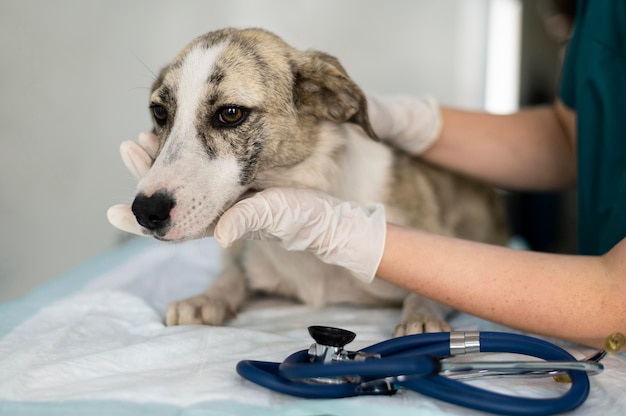Managing Pet Allergies During Pike Road’s Fall Months

Managing Pet Allergies During Pike Road’s Fall Months
As the leaves begin to change and Pike Road’s signature humidity lingers into autumn, many local pet owners discover that their dogs or cats are suddenly itching, sneezing, or experiencing other uncomfortable symptoms. If you’re noticing your pet scratching more than usual or dealing with watery eyes, you’re not alone; seasonal allergies in pets are a common issue during our Alabama fall. At Partners for Pets, located at 11123 Chantilly Parkway Unit G, Pike Road, AL 36064, our team of veterinarians is committed to helping your animals stay comfortable and healthy throughout every season. In this post, we’ll explore what causes pet allergies Pike Road pet owners should watch for, how to recognize symptoms, and which steps you can take to manage allergies both at home and with professional support.
Whether you’re a new pet parent or a seasoned local looking for a “vet near me” who understands regional allergens, you’ll find expert advice and compassionate care recommendations here. We’ll discuss common allergy triggers in the fall, share practical tips for relief, and explain when it’s time to schedule an appointment with our veterinary team. If you’re worried about your animal’s sneezing or scratching, remember that proactive care—like routine pet wellness examinations—can make all the difference.
Recognizing Fall Allergy Symptoms in Pike Road Pets
Understanding when your pet is suffering from allergies is the first step toward providing them with relief. The symptoms of pet allergies Pike Road residents notice during the fall often overlap with other common health issues, which can make it challenging to know when to seek veterinary help. Key symptoms include frequent scratching or licking, especially around the paws, face, or belly. You might also see red or inflamed skin, hair loss in certain spots, or notice your dog or cat shaking their head more than usual. Additional warning signs to watch for are watery or red eyes, sneezing, coughing, or even recurring ear infections in your pet. Some animals may develop hot spots or scabs, become less interested in playing, or seem unusually irritable because of constant discomfort.
In Pike Road and surrounding communities, these symptoms tend to appear or worsen as the season shifts and outdoor allergens become more prevalent. If your pet’s symptoms seem to flare up during walks, after time spent in the yard, or when windows are open at home, seasonal allergies are a likely culprit. It’s important to remember that while some mild symptoms can be managed at home, persistent or severe reactions should always be discussed with your veterinary team.
How Allergies Affect Quality of Life
Allergic reactions in pets don’t just cause physical discomfort; they can also impact your animal’s overall happiness and well-being. Chronic itching can lead to skin infections, while constant licking or biting may create wounds that take time to heal. Left unaddressed, allergies can make your pet withdrawn, anxious, or prone to secondary health problems. For this reason, it’s crucial to recognize the signs early and take steps to address the root cause rather than just treating symptoms as they arise.
What Causes Pet Allergies in Pike Road’s Fall Season?
To effectively address pet allergies Pike Road pet owners face, it’s helpful to understand what triggers these reactions during autumn. In our region, the high humidity and abundance of plant life create an environment ripe for both environmental and food-related allergies.
The primary causes of seasonal allergies in pets include pollen from ragweed, grasses, and trees that remain active late into the year. Mold spores thrive in damp conditions, making piles of fallen leaves and wet grass frequent sources of allergens. Dust mites can also become more problematic as pets spend increased time indoors with closed windows. Additionally, changes in diet or treats during the holidays sometimes trigger food sensitivities that mimic seasonal allergy symptoms.
Environmental and Indoor Triggers
Common environmental triggers in Pike Road can include outdoor allergens like pollen, as well as indoor contributors such as household cleaners, scented candles, or even new bedding introduced as the weather cools. Pet dander from other animals, as well as fleas—whose bites can cause both immediate itching and long-term allergic dermatitis—are also important considerations. If you notice your pet’s symptoms coincide with time spent in certain areas of the home or after outdoor play, discussing these details during a comprehensive pet exam can help our veterinarians pinpoint the exact cause.
Why Pike Road Pets Are Especially Vulnerable
Pike Road’s unique blend of humid air, late-blooming plants, and frequent rain showers means that allergens stick around longer than in drier climates. Local pets often encounter both outdoor triggers—like ragweed pollen and moldy leaves—and indoor allergens as families prepare their homes for cooler months. Young pets, newly adopted animals, and breeds with sensitive skin or allergies in their lineage may be especially prone to developing symptoms.
Treatment and Management Options for Pet Allergies Pike Road
Once you’ve recognized symptoms, effective management is the next step. At Partners for Pets, we recommend a combination of professional diagnosis and at-home care for the best results. Treatment options for seasonal allergies in pets depend on the underlying cause, severity, and your animal’s overall health.
Professional Veterinary Care
The first step in managing allergies is a thorough veterinary examination. Our veterinary team will ask about your pet’s history, daily routine, and environment, then perform a physical assessment to check for secondary conditions like skin infections or ear problems. In some cases, we may recommend in-clinic diagnostics to rule out other health issues or pinpoint specific allergens through blood or skin testing. This comprehensive approach ensures that each pet receives a tailored treatment plan.
Veterinary treatment options involve prescription antihistamines or anti-inflammatory medications to reduce itching, topical sprays or medicated shampoos to soothe irritated skin, and, in some cases, allergy injections to help desensitize your pet to certain triggers. If a food allergy is suspected, we may guide you through an elimination diet trial to identify the culprit. For pets with recurring problems, ongoing allergy management is often necessary, which might include regular check-ins and adjustments to your pet’s care plan as Pike Road’s environmental conditions change.
Supportive Therapies Available at Partners for Pets
In addition to medication, our team offers guidance on environmental modifications and ongoing wellness care to minimize allergic reactions. Veterinary professionals at our clinic can perform thorough ear cleanings, treat secondary skin infections, and monitor progress through follow-up visits. We also carry prescription diets and allergy-friendly products that may be recommended as part of your pet’s regimen. If you require medication refills or want to explore allergy treatments, our online pharmacy makes it easy to access necessary supplies from home.
Preventing and Managing Allergies at Home
While veterinary care is essential for moderate to severe cases, there are several steps Pike Road pet owners can take at home to help minimize exposure to allergens and manage mild symptoms. Bathing your pet with a veterinarian-approved, hypoallergenic shampoo can help wash away pollen and mold spores from their fur and skin. Wiping your pet’s paws and belly after outdoor walks removes particles that might otherwise be tracked inside and cause irritation. Regularly washing bedding, vacuuming floors, and using air purifiers may also help reduce indoor allergens, especially as windows stay closed during fall.
For pets with known sensitivities, feeding a consistent, high-quality diet and avoiding new treats or foods during allergy season can help prevent flare-ups. Additionally, keeping your lawn trimmed, cleaning up fallen leaves promptly, and limiting outdoor time during peak pollen hours are practical ways to reduce exposure to common triggers. If your pet’s allergies seem related to environmental changes, keeping a diary of symptoms and activities can provide valuable information for your next veterinary appointment.
When to Try Over-the-Counter Remedies
It is important to note that not all over-the-counter medications are safe for pets. Never administer human allergy medicines or creams without first consulting your veterinarian. Instead, focus on gentle home care routines, and if in doubt, reach out to your veterinary team for guidance.
When to Seek Veterinary Help for Seasonal Allergies in Pets
Some cases of pet allergies Pike Road pet owners face require immediate veterinary attention. If your pet develops open sores, persistent or bloody scratching, difficulty breathing, or swelling of the face or limbs, these can be signs of a severe allergic reaction that needs prompt care. Chronic symptoms that last more than a week, fail to improve with home management, or interfere with your pet’s daily activities also warrant a call to your veterinarian.
Our team at Partners for Pets is dedicated to providing personalized, comprehensive care for every animal. Scheduling a wellness examination is the best way to catch allergy problems early and tailor a management plan suited to your pet’s needs. If you’re unsure whether your pet’s symptoms are related to allergies or something more serious, our veterinarians are always here to answer your questions and provide expert recommendations.
Supporting Your Pet’s Comfort Through Every Season
Managing pet allergies in Pike Road’s fall months doesn’t have to be overwhelming. With a combination of professional veterinary support and thoughtful home care, your dog or cat can enjoy the changing seasons without the discomfort of persistent itching or sneezing. Taking proactive steps—like scheduling a veterinary exam, maintaining a clean home environment, and following your veterinarian’s recommendations—can make a significant difference in your pet’s quality of life.
If you are searching for a “vet near me” who understands the unique challenges of seasonal allergies in pets, look no further than the compassionate veterinary team at Partners for Pets. We invite you to schedule an appointment at our convenient Pike Road location for personalized guidance and effective allergy relief options. To learn more about our approach to pet wellness or to book a comprehensive pet exam, call us today at (334) 218-4500. Our veterinarians are proud to serve Pike Road and surrounding communities, offering trusted advice and quality veterinary services near me for every stage of your pet’s life.
This article is intended for informational purposes only and should not be considered a substitute for professional veterinary advice. If you have concerns about your pet’s health or symptoms, please contact your veterinarian directly for guidance and care.


















